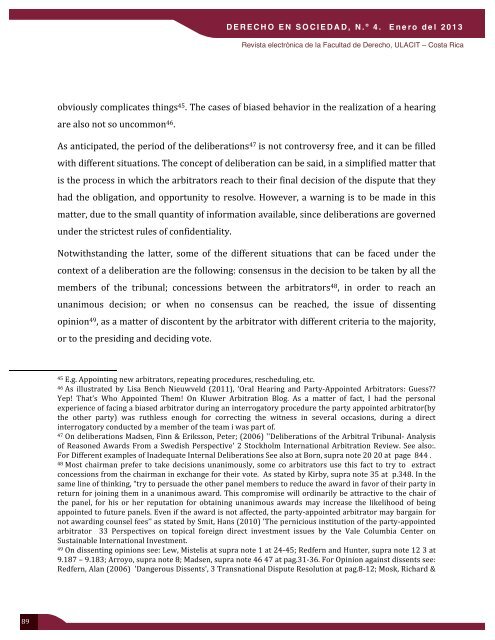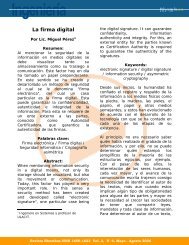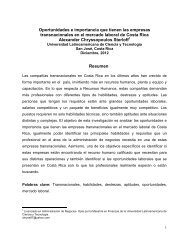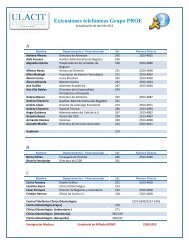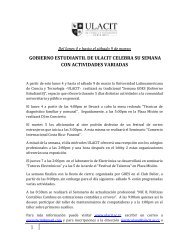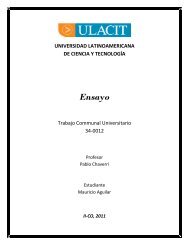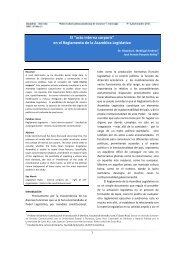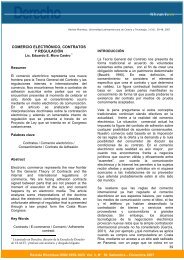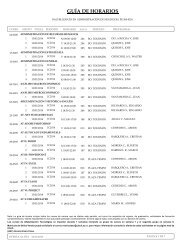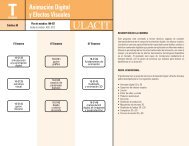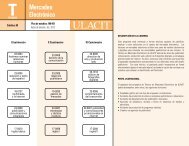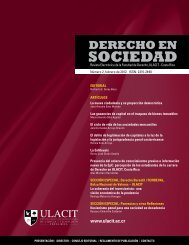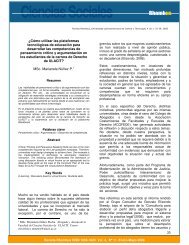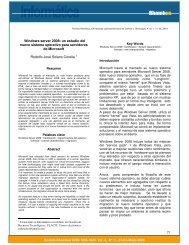IV Edición Revista Derecho en Sociedad - Ulacit
IV Edición Revista Derecho en Sociedad - Ulacit
IV Edición Revista Derecho en Sociedad - Ulacit
You also want an ePaper? Increase the reach of your titles
YUMPU automatically turns print PDFs into web optimized ePapers that Google loves.
DERECHO EN SOCIEDAD, N. º 4 . Enero del 2013<br />
<strong>Revista</strong> electrónica de la Facultad de <strong>Derecho</strong>, ULACIT – Costa Rica<br />
obviously complicates things 45 . The cases of biased behavior in the realization of a hearing <br />
are also not so uncommon 46 . <br />
As anticipated, the period of the deliberations 47 is not controversy free, and it can be filled <br />
with differ<strong>en</strong>t situations. The concept of deliberation can be said, in a simplified matter that <br />
is the process in which the arbitrators reach to their final decision of the dispute that they <br />
had the obligation, and opportunity to resolve. However, a warning is to be made in this <br />
matter, due to the small quantity of information available, since deliberations are governed <br />
under the strictest rules of confid<strong>en</strong>tiality. <br />
Notwithstanding the latter, some of the differ<strong>en</strong>t situations that can be faced under the <br />
context of a deliberation are the following: cons<strong>en</strong>sus in the decision to be tak<strong>en</strong> by all the <br />
members of the tribunal; concessions betwe<strong>en</strong> the arbitrators 48 , in order to reach an <br />
unanimous decision; or wh<strong>en</strong> no cons<strong>en</strong>sus can be reached, the issue of diss<strong>en</strong>ting <br />
opinion 49 , as a matter of discont<strong>en</strong>t by the arbitrator with differ<strong>en</strong>t criteria to the majority, <br />
or to the presiding and deciding vote. <br />
45 E.g. Appointing new arbitrators, repeating procedures, rescheduling, etc. <br />
46 As illustrated by Lisa B<strong>en</strong>ch Nieuwveld (2011), ‘Oral Hearing and Party-‐Appointed Arbitrators: Guess?? <br />
Yep! That’s Who Appointed Them! On Kluwer Arbitration Blog. As a matter of fact, I had the personal <br />
experi<strong>en</strong>ce of facing a biased arbitrator during an interrogatory procedure the party appointed arbitrator(by <br />
the other party) was ruthless <strong>en</strong>ough for correcting the witness in several occasions, during a direct <br />
interrogatory conducted by a member of the team i was part of. <br />
47 On deliberations Mads<strong>en</strong>, Finn & Eriksson, Peter; (2006) ''Deliberations of the Arbitral Tribunal-‐ Analysis <br />
of Reasoned Awards From a Swedish Perspective' 2 Stockholm International Arbitration Review. See also:. <br />
For Differ<strong>en</strong>t examples of Inadequate Internal Deliberations See also at Born, supra note 20 20 at page 844 . <br />
48 Most chairman prefer to take decisions unanimously, some co arbitrators use this fact to try to extract <br />
concessions from the chairman in exchange for their vote. As stated by Kirby, supra note 35 at p.348. In the <br />
same line of thinking, “try to persuade the other panel members to reduce the award in favor of their party in <br />
return for joining them in a unanimous award. This compromise will ordinarily be attractive to the chair of <br />
the panel, for his or her reputation for obtaining unanimous awards may increase the likelihood of being <br />
appointed to future panels. Ev<strong>en</strong> if the award is not affected, the party-‐appointed arbitrator may bargain for <br />
not awarding counsel fees’’ as stated by Smit, Hans (2010) 'The pernicious institution of the party-‐appointed <br />
arbitrator 33 Perspectives on topical foreign direct investm<strong>en</strong>t issues by the Vale Columbia C<strong>en</strong>ter on <br />
Sustainable International Investm<strong>en</strong>t. <br />
49 On diss<strong>en</strong>ting opinions see: Lew, Mistelis at supra note 1 at 24-‐45; Redfern and Hunter, supra note 12 3 at <br />
9.187 – 9.183; Arroyo, supra note 8; Mads<strong>en</strong>, supra note 46 47 at pag.31-‐36. For Opinion against diss<strong>en</strong>ts see: <br />
Redfern, Alan (2006) 'Dangerous Diss<strong>en</strong>ts', 3 Transnational Dispute Resolution at pag.8-‐12; Mosk, Richard & <br />
89


